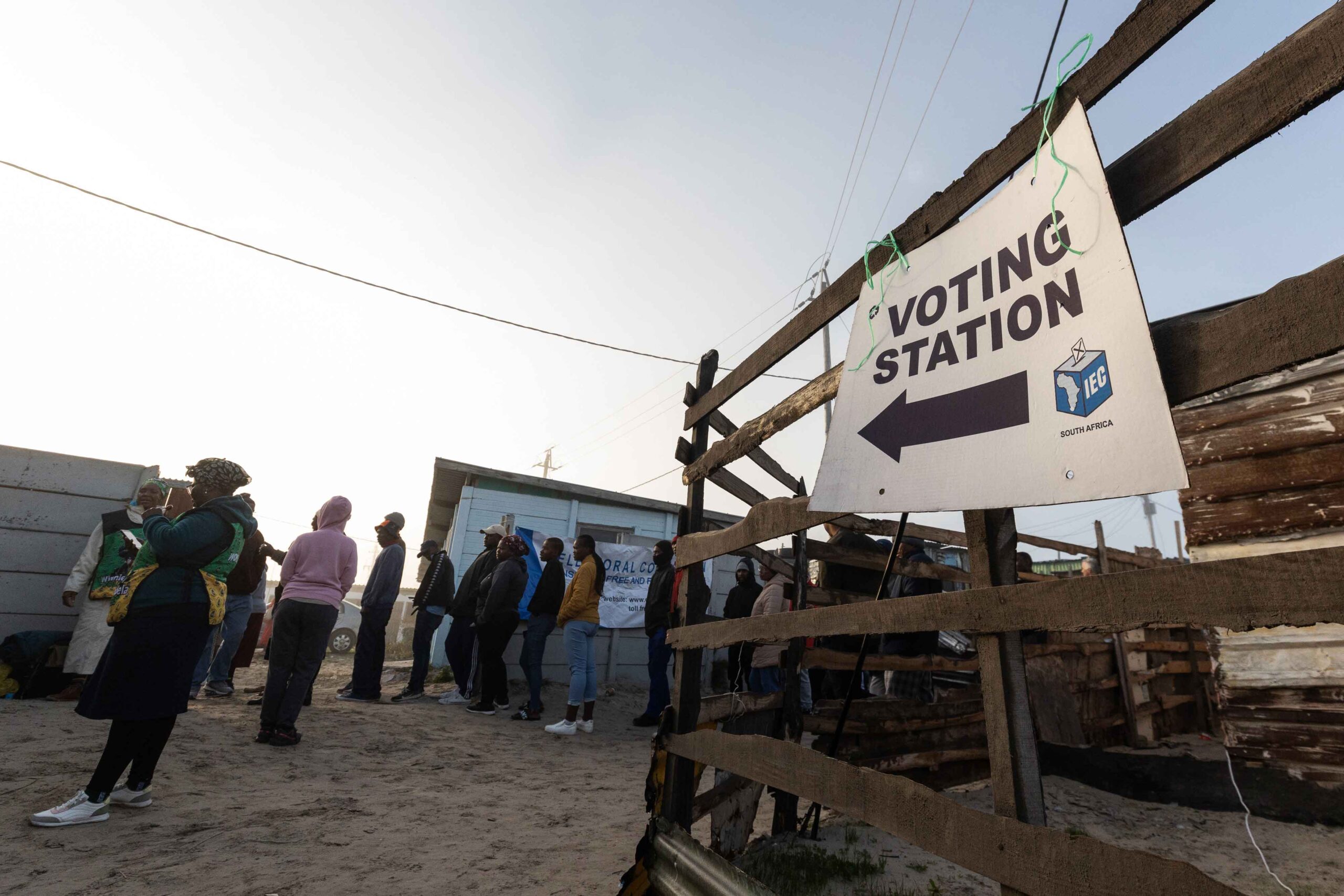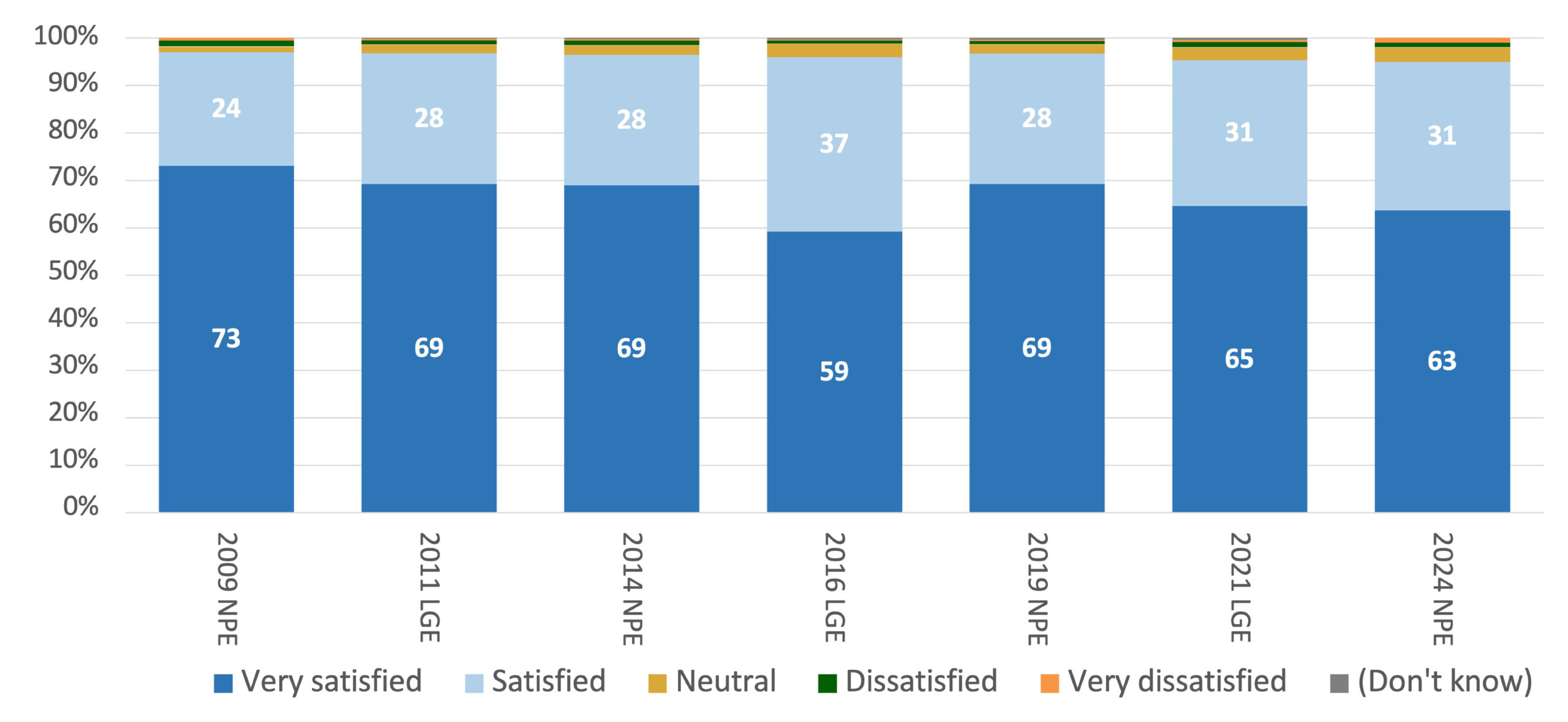Election 2024 is behind us, and the people have spoken as reflected in the HSRC’s Election Satisfaction Survey, which was conducted for the Electoral Commission of South Africa (IEC). In this article, Ben Roberts, Narnia Bohler-Muller and Jarè Struwig offer insights into the survey series and its significance in assessing whether the elections were free and fair from a democratic perspective.

Residents in Khayelitsha queue to vote during the 2024 elections in Cape Town, South Africa. Photo by Ashraf Hendricks, GroundUp (CC BY-ND 4.0)
Marking 30 years since the first democratic elections in South Africa, the country’s seventh national and provincial elections took place on 29 May 2024. As with all elections since the late 1990s, the HSRC conducted a voter satisfaction survey, which provided evidence that was then used by the Electoral Commission in declaring the election free and fair.
On the day, HSRC data collectors each interviewed 50 voters at 300 randomly selected voting stations across the country. These voting stations were selected based on provincial distribution, the number of registered voters per voting station, and other key demographic characteristics.
The data collectors ultimately conducted 13,155 interviews across all nine provinces. Voters were asked about their views on various aspects of their election experiences, including the perceived integrity of the election process and the operational efficiency of the IEC.
The results of this latest round of the Election Satisfaction Survey (ESS) indicated that voters overwhelmingly believed the 2024 elections were free and fair (92%) and positively rated the conduct of officials at voting stations (Figures 1–3).
When asked why they deem the elections to be free and fair, voters emphasised their ability to make political choices freely, without force, pressure or intimidation. Political freedom and the right to choose freely are key values upheld by the South African voting public and remain crucial for the integrity and legitimacy of the electoral process.
Figure 1. Voter responses to the question: “Do you think that the election procedures were free?” (2009-2024)

Source: Election Satisfaction Survey (ESS) 2024
Figure 2. Voter responses to the question: “Do you think that the election procedures were fair?” (2009-2024)

Source: Election Satisfaction Survey (ESS) 2024
Figure 3. Voter responses to the question: “Are you satisfied with the quality of service that the IEC officials provided to voters?” (2009-2024)

Source: Election Satisfaction Survey (ESS) 2024
Of the seven indicators measured to gauge views on officials, “helpful” received the most positive evaluation, with 84% of voters describing officials as helpful to “a great extent”. The indicator that received the lowest rating was “impartial”, with 71% saying this applied “to a great extent”, while 8% stated that officials were not at all impartial.
Trust
Trust in the IEC was high among the voting public (84%). As shown in Figure 4, almost all voters (95%) felt safe casting their ballots in secrecy (64% very satisfied, 31% somewhat satisfied).
Figure 4. Voter responses to the question: “Are you satisfied that your vote in this voting station was secret?” (2009-2024)

Source: Election Satisfaction Survey (ESS) 2024
Vulnerable groups
The majority of voters felt that the IEC adequately addressed the needs of vulnerable groups, such as the elderly and people with disabilities (Figure 5).
Figure 5. Voter responses to the question: “To what extent did the voting procedure at this voting station consider the needs of special groups?” (2009-2024)

Source: Election Satisfaction Survey (ESS) 2024
Queuing times and their effect
Queuing time at voting stations increased in 2024 compared to recent elections, with the percentage of voters reporting a wait of 15 minutes or less declining from 76% in 2019 to 60% in 2024. The share reporting a wait of over one hour was the highest recorded since 2009, with voters in Gauteng particularly affected by disproportionately lengthy queuing times. Longer waits had a bearing on electoral evaluations, leading to slightly more negative responses (Table 1).
Table 1. Queuing times and their impact on voters’ evaluations (2024)

Source: Election Satisfaction Survey (ESS) 2024
Self-reported coercion
In the context of Election 2024, 12% of voters reported experiencing attempts to force them to vote for a certain political party or candidate, indicating a noticeable increase compared to previous elections. This pressure predominantly occurred before Election Day, with political party agents, friends and family being the primary sources. Among those reporting coercion, 73% stated that it had no impact on their electoral choice, 25% said it influenced their vote, and 2% were uncertain. This translates to 3% of all voters who changed their vote due to reported coercion.
Overall, the results of the 2024 survey indicate the ongoing integrity of the election process and the Commission. Despite longer queuing times and technical challenges experienced with voter management devices (VMDs) on Election Day, voters provided positive evaluations.
Impact of the HSRC research
The survey results of the ESS are typically available within 48 hours after the election and serve as evidence that informs the Electoral Commission’s official declaration that the elections were free and fair. Following the election, these results also inform operational decision-making in preparation for future polls.
History of supporting the Electoral Commission
The Electoral Commission’s mandate is to ensure proper administration of elections in South Africa. Additionally, the Commission is dedicated to boosting voter registration and turnout by investing in civic education and outreach programmes between elections.
Since the 1990s, the HSRC has supported the Electoral Commission with several surveys. This collaboration has focused on generating survey-based evidence to inform operational planning and outreach efforts.
Apart from the ESS series, the HSRC has conducted pre-election surveys, namely the nationally representative Voter Participation Survey (VPS) series.
While the primary goal of the ESS is to assess the Electoral Commission’s operational efficiency on election days, the VPS provides a broad view of the socio-political landscape leading up to an election.
Since 2010, the HSRC has successfully conducted the VPS and ESS for the municipal elections of 2011, 2016 and 2021, as well as the national and provincial elections of 2014, 2019 and 2024. Additionally, the Electoral Commission has engaged the HSRC to curate all election surveys conducted by the HSRC on their behalf.
Public opinion surveys of this type are an essential and valuable tool for capturing a nationwide perspective on voters’ views, electoral experiences and evaluations. Understanding electoral attitudes, behaviours and experiences is crucial for understanding the functioning of electoral democracy, both at the institutional and societal levels.
Improving the ballot paper
In 2018, the Independent Electoral Commission of South Africa (IEC) commissioned the HSRC to review the ballot paper used in national, provincial and local government elections. Based on interviews with focus groups, electoral staff and academics, several recommendations from the HSRC’s report were incorporated into the design of the May 2019 provincial and national ballot papers. While the alphabetical listing of parties was retained, those with similar identifiers were randomised to prevent them from appearing adjacent to each other on the ballot paper. This adjustment aimed to help voters to easily identify their chosen party. The study’s success stemmed not only from the revised ballot paper but also from the fact that it highlighted the importance of balloting education.
The HSRC survey continues to collect data aimed at enhancing ballot papers. According to the 2024 ESS results, the majority of the voting population expressed satisfaction with the ballot papers, with 58% stating they were “very satisfied” and 35% indicating they were “satisfied”. Among the 38% who wanted to improve the ballot paper for future elections, 51% favoured changing the size of the party logos, 38% wanted adjustments to the number of parties and candidates listed, and 36% supported altering the size of the party names or acronyms, as well as candidate names.
The introduction of a third ballot paper in Election 2024 and the unprecedented number of contesting parties and independent candidates appearing on the ballots not only underscored the need for further balloting education but also raised questions about the potential adoption of electronic voting (e-voting) in future elections. This method would involve voters using voting machines rather than paper ballots at voting stations. While public opinion on this matter remains divided, the Electoral Commission commissioned the HSRC to conduct a desktop review of e-voting experiences internationally in 2023/24. Additionally, the HSRC was tasked with preparing a discussion paper and conducting consultations in the current financial year to lay the groundwork for a green paper on the topic.
Research contacts:
Dr Benjamin Roberts (director), Professor Narnia Bohler-Muller (divisional executive), and Dr Jarè Struwig (chief research specialist), in the Developmental, Capable and Ethical State research division of the HSRC
jstruwig@hsrc.ac.za


